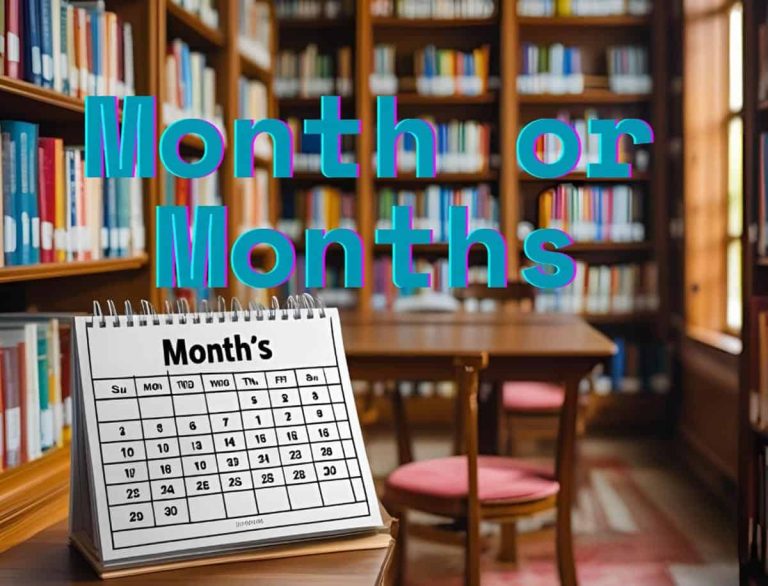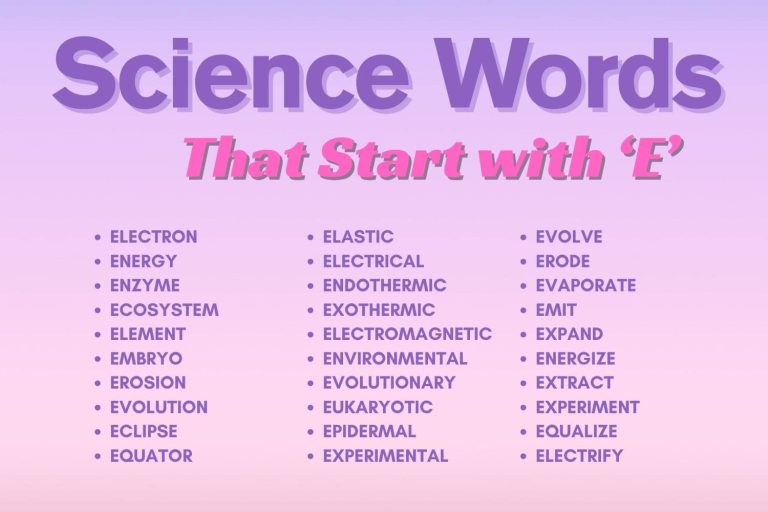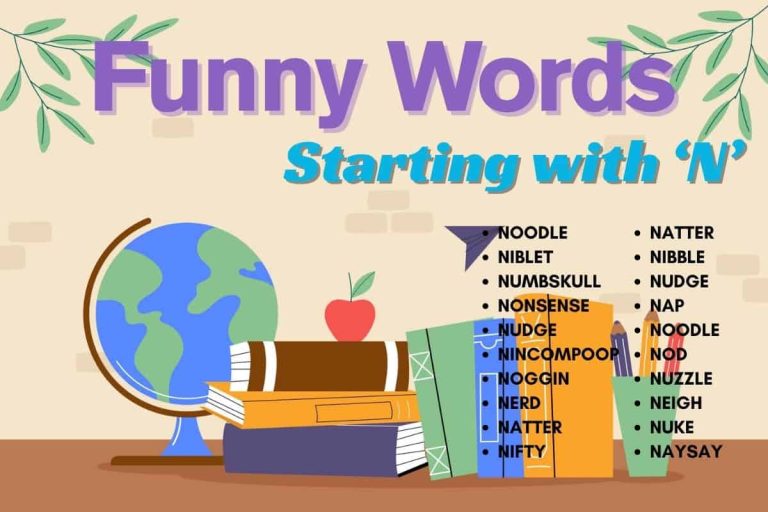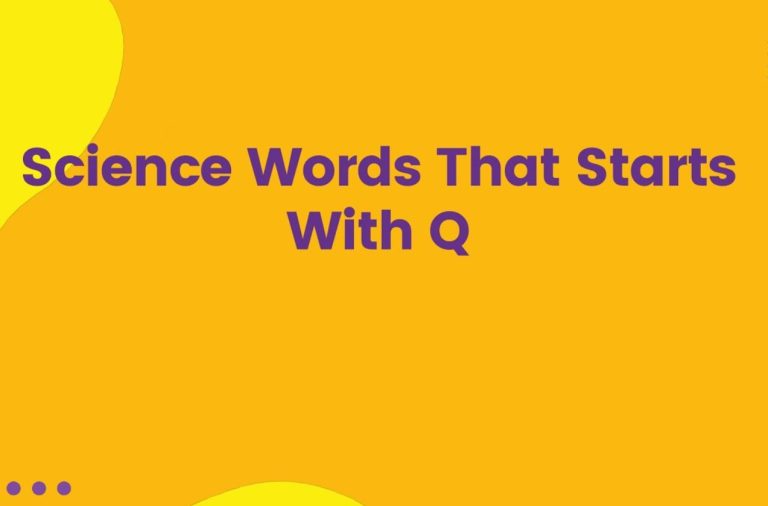101+ Funny Words That Start with B: Hilarious & Quirky Terms
English is full of words, some serious, some mundane, and some downright hilarious. Understanding these words can enrich your vocabulary, add color to your conversations, and even improve your comprehension of English literature and media.
By exploring the definitions, usages, and nuances of these funny words starting with “B.”, you’ll gain a deeper appreciation for the playful nature of the English language. So, brace yourself for a barrage of “B” words that are bound to bring a bit of levity to your day!
This guide is perfect for English language learners, writers seeking to add humor to their work, and anyone who enjoys the lighter side of language.
Defining Funny Words Starting with “B”
The concept of “funny” is subjective, but in this context, “funny words starting with B” refers to words that evoke amusement, laughter, or a sense of the absurd. These words often sound peculiar, have unusual meanings, or are used in humorous contexts.
They might be onomatopoeic, slang, archaic, or simply silly in their sound or connotation. Often, the funniness of a word comes from its unexpectedness or its contrast with more serious or formal language.
Understanding why these words are considered funny requires an appreciation for etymology, cultural context, and linguistic playfulness.
These words don’t necessarily adhere to a single grammatical category. They can be nouns, verbs, adjectives, or adverbs, depending on their specific meaning and usage.
Their function in a sentence is determined by their grammatical role, just like any other word. However, their comedic effect stems from their unique sound, meaning, or cultural association.
The contexts in which these words are used are crucial to their perceived funniness. A word might be hilarious in a casual conversation but inappropriate in a formal setting.
The speaker’s tone, the audience, and the overall situation all contribute to the comedic impact of these words. For example, using an archaic word like “bamboozle” in a modern conversation can be funny because it sounds old-fashioned and out of place.
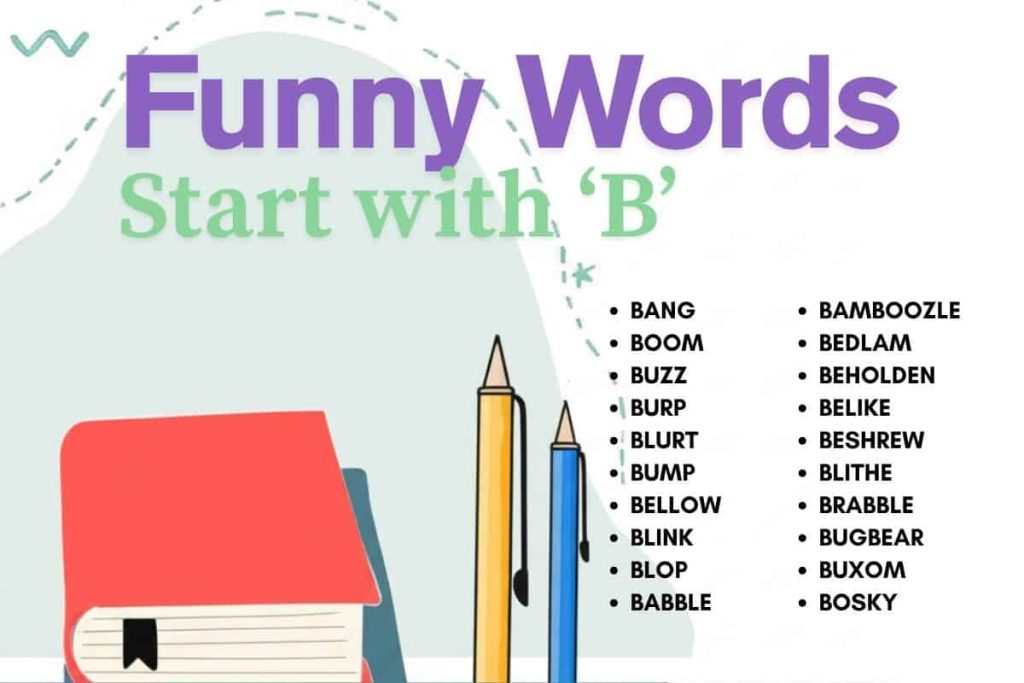
Categories of Funny “B” Words
To better understand the diverse range of funny “B” words, we can categorize them into several distinct types:
Onomatopoeic Words
Onomatopoeic words imitate sounds. These words are inherently funny because they attempt to capture the essence of a sound in a linguistic form.
The letter “B” features prominently in many onomatopoeic words, often related to sounds of impact or bubbling.
Slang and Informal Terms
Slang terms are informal words or phrases that are often used within specific social groups or communities. Their humor often comes from their novelty, their irreverence, or their use in unexpected contexts.
Many slang terms starting with “B” are used to describe people, situations, or objects in a humorous or exaggerated way.
Archaic and Obsolete Words
Archaic words are words that were once commonly used but are now rare or obsolete. Their humor often arises from their old-fashioned sound and their incongruity in modern conversation.
Using an archaic “B” word can create a humorous effect by evoking a sense of historical distance and linguistic playfulness.
Silly and Nonsensical Words
Silly words are words that have no real meaning or are used in a playful, nonsensical way. These words are often created for humorous effect and are commonly found in children’s literature and comedic writing.
The sheer absurdity of these words is what makes them funny.
Euphemistic Words
Euphemisms are mild or indirect words or expressions used to replace ones considered too harsh or blunt. Sometimes, the use of a euphemism, especially if overly elaborate or absurd, can be humorous.
“B” words can be used euphemistically to soften the impact of sensitive topics.
Examples of Funny “B” Words
To illustrate the different categories of funny “B” words, let’s look at some specific examples:
Onomatopoeic Examples
These words mimic sounds, often in a comical way. The table below contains examples of onomatopoeic “B” words, along with their meanings and example sentences.
| Word | Meaning | Example Sentence |
|---|---|---|
| Bang | A sudden loud noise. | The door slammed with a bang. |
| Boom | A deep, resonant sound. | The thunder boomed across the sky. |
| Buzz | A low, humming sound. | The bee buzzed around the flower. |
| Bubble | A small, spherical body of gas in a liquid. | The soap created a large bubble. |
| Burp | To expel gas from the stomach. | He let out a loud burp after dinner. |
| Blurt | To say something suddenly and without thinking. | She blurted out the secret. |
| Bump | A sudden impact. | The car hit a bump in the road. |
| Bellow | A loud, deep shout. | The coach bellowed instructions to the team. |
| Blink | To shut and open the eyes quickly. | He blinked in the bright sunlight. |
| Blop | A sound of something soft falling into liquid. | The ice cream fell into the soup with a blop. |
| Babble | To talk rapidly and unintelligibly. | The baby babbled happily. |
| Bark | The sharp, loud cry of a dog. | The dog barked at the mailman. |
| Beat | To strike repeatedly. | The drum beat loudly. |
| Bleat | The cry of a sheep or goat. | The sheep bleated in the field. |
| Bluster | To talk loudly and aggressively. | He blustered about his accomplishments. |
| Boing | The sound of a spring being released. | The spring went ‘boing‘ as it snapped back. |
| Bash | To strike violently and heavily. | He bashed the door open. |
| Biff | To strike someone hard. | The cartoon character biffed the villain. |
| Blam | The sound of an explosion or gunshot. | ‘Blam!’ went the firework. |
| Blurp | A sound similar to a bubble popping. | The fish made a blurp sound as it surfaced. |
| Bomb | The sound of an explosion. | The bomb went off with a loud noise. |
| Bonk | A dull thud. | He hit his head with a ‘bonk‘. |
| Brrr | The sound of shivering. | “Brrr, it’s cold!” she said. |
| Buffet | To strike forcefully. | The wind buffeted the trees. |
| Buzzer | The sound of a buzzer. | The buzzer signaled the end of the game. |
Slang Examples
Slang words are informal and often humorous. The table below presents examples of slang “B” words, their meanings, and example sentences.
| Word | Meaning | Example Sentence |
|---|---|---|
| Bling | Expensive, flashy jewelry. | He was wearing so much bling it hurt my eyes. |
| Bummer | A disappointing or unpleasant situation. | It’s a real bummer that the concert was canceled. |
| Booze | Alcoholic drinks. | They brought plenty of booze to the party. |
| Babe | An attractive person. | He thought she was a total babe. |
| Buck | A dollar. | That shirt costs twenty bucks. |
| Bust | To arrest someone. | The police busted him for drug possession. |
| Ballsy | Courageous or daring. | That was a ballsy move, but it paid off. |
| Bogus | Fake or not genuine. | That ID is totally bogus. |
| Bomb | Excellent or impressive. | That movie was the bomb! |
| Bread | Money. | He needs to earn some bread to pay his bills. |
| Bail | To leave or escape. | I’m going to bail on this party; it’s boring. |
| Basic | Unoriginal or mainstream. | She’s so basic with her pumpkin spice latte. |
| Beef | A complaint or grievance. | What’s your beef with him? |
| Bent | Corrupt or dishonest. | The cops were bent so the case was thrown out. |
| Biggie | Important or significant. | It’s no biggie; don’t worry about it. |
| Bite me | An expression of defiance or dismissal. | “Do the dishes!” “Bite me!” |
| Blast | A really fun time. | We had a blast at the concert last night. |
| Blow | To leave quickly. | I’m gonna blow this joint. |
| Blue | Sad or depressed. | I’m feeling a bit blue today. |
| Broke | Having no money. | I’m totally broke until payday. |
| Brush off | To ignore or dismiss someone. | She tried to talk to him, but he brushed her off. |
| Buzzkill | Someone who ruins the fun. | Don’t be such a buzzkill! |
| Busted | Caught doing something wrong. | He got busted for cheating on the test. |
| Butter up | To flatter someone to get what you want. | He tried to butter her up to get a raise. |
Archaic Examples
Archaic words, while no longer in common use, can be amusing due to their antiquated sound. The table below provides examples of archaic “B” words, their meanings, and example sentences.
| Word | Meaning | Example Sentence |
|---|---|---|
| Bamboozle | To deceive or trick. | He tried to bamboozle me with his fake story. |
| Bedlam | A state of chaos or confusion. | The classroom descended into bedlam when the teacher left. |
| Beholden | Indebted or obligated. | I am beholden to you for your kindness. |
| Belike | Probably or likely. | It is belike that it will rain tomorrow. |
| Beshrew | To curse or blame. | Beshrew the day I met him! |
| Betwixt | Between. | The house lies betwixt the two mountains. |
| Bide | To wait or remain. | We must bide our time until the opportunity arises. |
| Blithe | Carefree and cheerful. | She had a blithe spirit and always saw the best in people. |
| Bower | A pleasant shady place under trees. | They met in a secluded bower. |
| Brabble | To argue or quarrel noisily about something unimportant. | The children brabbled over the toy. |
| Bootless | Useless or futile. | Their efforts were bootless in the face of such opposition. |
| Bounteous | Generously giving or abundant. | The earth provides a bounteous harvest. |
| Brazen | Bold and without shame. | He made a brazen attempt to cheat on the test. |
| Brethren | Brothers (often used in a religious context). | The brethren gathered for prayer. |
| Bruited | Spread news or rumors widely. | It was bruited about that he was leaving the company. |
| Bugbear | A cause of fear or annoyance. | Public speaking is my personal bugbear. |
| Buxom | (of a woman) plump and attractive. | She was known for her buxom figure. |
| Bygone | Belonging to an earlier time. | They reminisced about bygone days. |
| Bosky | Covered with bushes, shrubs, and small trees. | They enjoyed walking through a bosky area of the forest. |
| Billow | A large undulating mass of something, typically cloud, smoke, or steam. | The smoke began to billow from the chimneys. |
Silly Examples
These words are inherently funny because they are nonsensical or playful. The table below provides examples of silly “B” words, along with their meanings (often invented) and example sentences.
| Word | Meaning | Example Sentence |
|---|---|---|
| Bumbershoot | A whimsical term for an umbrella. | Don’t forget your bumbershoot; it’s raining cats and dogs! |
| Balderdash | Nonsense or foolish talk. | That’s a load of balderdash! |
| Bibble | To drink noisily. | The toddler bibbled his milk all over his face. |
| Boffola | A joke that elicits loud laughter. | That comedian told a real boffola! |
| Blatherskite | A person who talks foolishly at length. | Don’t listen to him; he’s just a blatherskite. |
| Brouhaha | A noisy and overexcited reaction or response to something. | The announcement caused quite a brouhaha. |
| Bobble | To move unsteadily or wobble. | The ornament bobbled on the tree branch. |
| Boodle | A large quantity of money, often obtained illegally. | He escaped with a boodle of stolen cash. |
| Buffoon | A ridiculous but amusing person; a clown. | He acted like a complete buffoon at the party. |
| Bugaboo | An object of needless fear or anxiety. | The upcoming exam is her biggest bugaboo. |
| Ballyhoo | Extravagant publicity or fuss. | There was a lot of ballyhoo surrounding the movie premiere. |
| Bees knees | Something excellent or of very high quality. | That new car is the bees knees. |
| Bumfuzzle | To confuse or fluster. | The complicated instructions bumfuzzled me. |
| Bumptious | Offensively self-assertive or proud. | His bumptious attitude annoyed everyone. |
| Boffo | Extremely successful. | The play was a boffo hit on Broadway. |
| Barnacle | A comical term of endearment. | Hey there, you old barnacle! |
| Binkie | A child’s pacifier. | He always needs his binkie to go to sleep. |
| Blubber | To cry noisily and uncontrollably. | She started to blubber after hearing the bad news. |
| Bungler | Someone who clumsily or ineptly carries out a task. | The bungler spilled coffee all over the report. |
| Bumbershoot | A silly name for an umbrella. | I’ll take my bumbershoot when I go out today. |
Euphemistic Examples
Euphemistic words can be funny when they are used in an overly elaborate or absurd way to soften a harsh reality. The table below lists examples of euphemistic “B” words, their meanings, and example sentences.
| Word | Meaning | Example Sentence |
|---|---|---|
| Bought the farm | Died (often in military context). | He bought the farm during the war. |
| Big boned | Overweight. | She described herself as big-boned. |
| Blessing | A child (used to avoid saying “pregnant”). | They are expecting a blessing in the new year. |
| Belly up | To fail or go bankrupt. | The company finally bellied up after years of struggling. |
| Between jobs | Unemployed. | He’s currently between jobs. |
| Been around the block | Experienced or worldly (sometimes implying promiscuity). | She’s been around the block; she knows how things work. |
| Blemished | Imperfect or flawed. | The product was sold at a discount because it was slightly blemished. |
| Bathing suit area | The genitals. | She had a rash in her bathing suit area. |
| Blowing chunks | Vomiting. | After the roller coaster, he was blowing chunks. |
| Bottoms up | A toast before drinking. | Okay everyone, bottoms up! |
Usage Rules
While funny words can add humor to your language, it’s crucial to use them appropriately. Consider the context, your audience, and your overall purpose.
Avoid using slang or archaic words in formal settings. Be mindful of potentially offensive connotations, and always prioritize clarity and respect.
When using onomatopoeic words, ensure they accurately reflect the sound you’re trying to convey. Overusing onomatopoeia can become repetitive and distracting.
Use them sparingly and creatively to enhance your writing.
Archaic words can be funny, but they can also be confusing if your audience is not familiar with them. Use them judiciously and provide context if necessary.
Slang terms are highly context-dependent and can quickly become outdated. Keep up with current trends and avoid using slang that is no longer in common use.
Common Mistakes
One common mistake is using slang or archaic words in formal writing or speech. This can make you sound unprofessional or out of touch.
Another mistake is misusing onomatopoeic words, either by using them incorrectly or overusing them. Always double-check the meaning and usage of a word before using it, especially if it’s a slang or archaic term.
Here’s a table illustrating common mistakes and their corrections:
| Incorrect | Correct | Explanation |
|---|---|---|
| “The CEO was completely bamboozled by the quarterly report.” | “The CEO was completely deceived by the quarterly report.” | “Bamboozled” is too informal for a professional context. |
| “The car went bang, boom, blurt!” | “The car went bang!” | Overusing onomatopoeia can be distracting. |
| “She’s a real basic person, always reading Shakespeare.” | “She’s a very traditional person, always reading Shakespeare.” | “Basic” has negative connotations; it is inappropriate here. |
Practice Exercises
Test your understanding of funny “B” words with these exercises:
- Fill in the blank: The children’s room was in complete _______ after the pillow fight.
Answer: bedlam
- Rewrite the sentence using a funnier word: “He tricked me into buying a fake watch.”
Answer: He bamboozled me into buying a fake watch.
- Identify the onomatopoeic word in the following sentence: “The balloon popped with a loud bang.”
Answer: bang
- Choose the most appropriate word to complete the sentence: “She was wearing so much _______ it was blinding.” (bling, book, bash)
Answer: bling
- What does “bailing” mean in the sentence, “I’m going to bail on this party; it’s boring.”?
Answer: To leave.
- What type of word is ‘bumbershoot’?
Answer: Silly word.
- What does ‘bought the farm’ mean?
Answer: Died.
- Correct the following sentence: “I’m beholden you for your help.”
Answer: I am beholden to you for your help.
- Provide a synonym for ‘blithe’.
Answer: Cheerful.
- What does it mean if someone is described as ‘bumptious’?
Answer: Offensively self-assertive or proud.
Exercise 2: Multiple Choice
-
- Which of these is an archaic word? a) bling b) bamboozle c) buzzkill d) basic
Answer: b) bamboozle
-
- Which of these is a slang term? a) beholden b) bumbershoot c) booze d) blithe
Answer: c) booze
-
- Which of these is an onomatopoeic word? a) bluster b) bellow c) bang d) ballyhoo
Answer: c) bang
-
- What does “big-boned” euphemistically mean? a) tall b) overweight c) muscular d) athletic
Answer: b) overweight
-
- Which of these is a silly word for an umbrella? a) bumbershoot b) brouhaha c) bugbear d) boodle
Answer: a) bumbershoot
-
- What does “betwixt” mean? a) before b) behind c) between d) below
Answer: c) between
-
- Which of these is NOT an onomatopoeic word? a) bang b) buzz c) bellow d) behoove
Answer: d) behoove
-
- What does “ballyhoo” mean? a) a quiet gathering b) extravagant publicity c) a small stream d) a type of bird
Answer: b) extravagant publicity
-
- What does “to bide” mean? a) to hurry b) to wait c) to leave d) to search
Answer: b) to wait
-
- Which word is used to describe someone who talks foolishly at length? a) buffoon b) blatherskite c) bungler d) bumptious
Answer: b) blatherskite
Exercise 3: Matching
Match the word with its definition.
| Word | Definition |
|---|---|
| 1. Balderdash | a. To deceive or trick |
| 2. Bamboozle | b. A noisy and overexcited reaction |
| 3. Brouhaha | c. Nonsense or foolish talk |
| 4. Boffola | d. Carefree and cheerful |
| 5. Blithe | e. A joke that elicits loud laughter |
Answers:
1-c, 2-a, 3-b, 4-e, 5-d
Advanced Topics
For advanced learners, consider exploring the etymology of funny “B” words, tracing their origins and evolution over time. Research the cultural contexts in which these words are used and how their meanings and connotations have changed.
Analyze the use of humor in language and how it contributes to social interaction and communication. Explore the use of alliteration and assonance in creating humorous effects with “B” words.
Consider the sociolinguistic factors that influence the creation and spread of slang terms.
FAQ
- What makes a word “funny”?
The funniness of a word is subjective and depends on factors like sound, meaning, context, and cultural associations. Words can be funny because they are unexpected, absurd, or evoke a sense of playfulness.
- Are slang words appropriate to use in all situations?
No, slang words are generally inappropriate for formal settings. Use them cautiously and be mindful of your audience and the overall context.
- How can I learn more funny words?
Read widely, listen to diverse speakers, and pay attention to the nuances of language. Explore dictionaries, slang dictionaries, and online resources dedicated to etymology and word origins.
- Is it okay to use archaic words in modern conversation?
Yes, but use them sparingly and with awareness. Archaic words can be funny if used intentionally, but they can also sound pretentious or confusing if overused.
- What is onomatopoeia?
Onomatopoeia is the creation of words that imitate sounds. These words are often inherently funny because they attempt to capture the essence of a sound in a linguistic form.
- How do euphemisms contribute to humor?
Euphemisms can be funny when they are overly elaborate or absurd, creating a humorous contrast with the reality they are trying to soften.
- What is the best way to use funny words in my writing?
Use them sparingly and intentionally to enhance your writing. Consider using alliteration or assonance to create a humorous effect. Make sure the words are appropriate for your
context and audience.
- How do I avoid misusing slang?
Stay updated on current slang trends, understand the specific meanings and connotations of slang terms, and be mindful of your audience. If in doubt, avoid using slang altogether.
- Can funny words be offensive?
Yes, some funny words can be offensive, especially if they are used to demean or stereotype individuals or groups. Be mindful of the potential impact of your words and avoid using language that could be hurtful or disrespectful.
- Are there regional differences in what words are considered funny?
Yes, humor is often culturally and regionally specific. What is considered funny in one region may not be funny in another. Be aware of cultural differences and adapt your language accordingly.
Conclusion
Funny words starting with “B” offer a delightful glimpse into the playful and creative aspects of the English language. From onomatopoeic sounds to archaic expressions and silly inventions, these words can add color, humor, and personality to your communication.
By understanding the different categories of funny “B” words and using them appropriately, you can enhance your vocabulary, improve your writing, and bring a bit of levity to your daily interactions. So go forth and embrace the baffling banter of “B” words, but always remember to use them with consideration and respect for your audience.

